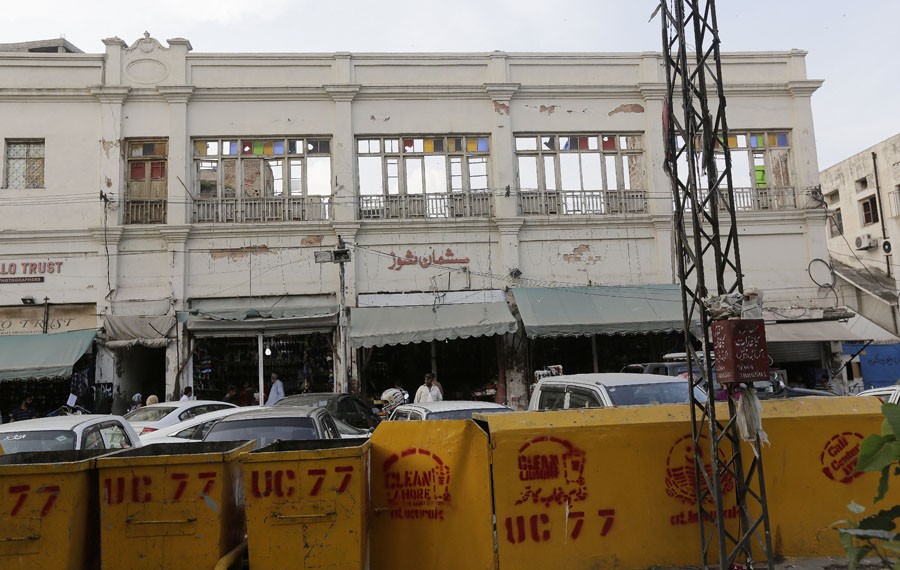
What prompted an LHC ruling to fine those who throw litter on the Mall road?

The Mall is one of Lahore’s most important roads, especially by virtue of the many historical buildings lining it that were constructed under the British Raj, and also for hosting Bagh e Jinnah and countless dense trees. Unfortunately, those who take the road aren’t often civil enough and litter it with food wrappers or any scrap whenever.
To keep the general public attitudes in check, the Lahore High Court recently passed a ruling wherein anyone ‘caught in the act’ shall be fined Rs1,000; the ‘act’ includes those found spitting on the road.
The court also instructed concerned authorities to start renovation of the dilapidated heritage buildings on the road. It earmarked 24 such structures, including the Zamzama Gun.
This might be the first time that the court passed a ruling with regards to penalising those who throw litter on the road, but there have been instances where it ordered to restore the ambient buildings. In 1996, for instance, renowned lawyer M D Tahir filed a petition to revive the glory of The Mall. In 2001, the court ordered to renovate buildings and remove large billboards on the road. The task was accomplished under the supervision of the then deputy commissioner Kamran Lashari who currently serves as director general of the Walled City of Lahore Authority (WCLA).
"Previous city district authorities tried several times to restore the glory of The Mall and put in efforts to create an ambiance that would reflect the rich cultural and architectural heritage of the road. Sadly, those efforts weren’t long lasting," says Lashari, talking to TNS.
"Anarkali Food Street came up, historical buildings were renovated, billboards removed, and The Mall’s cultural mood was revived," he adds.
"Unfortunately, all efforts went in vain because of the uncivilised behaviour of the general public, the non-cooperative response of traders, and the indifferent attitude of politicians and media."
The LHC has also asked the City District Government of Lahore (CDGL) to launch an awareness campaign with the help of the traffic police before going ahead with the renovation part.
"This order is meant to regulate the actions of the public based on norms, laws, and regulations. All developed societies adopt these," says Zaigham Khan, an anthropologist. "Psychological and cultural changes are needed to develop a society. The process is called ‘acculturation.’ But to achieve the purpose, the media, NGOs, politicians, and district government should play their part."
Anthopologist Nadeem Omar Tarar stresses on the need for "civic education to be made part of our curriculum. This way, we can teach our future generations to find associations with heritage and history.
"Though periodical efforts to create awareness among adults are good, I’d call these merely cosmetic. Attitudes of adults are hard to modify."
August 7 was the deadline set for the CDGL to launch the awareness campaign on The Mall as well as to seek help from LESCO to fix the hanging cables and wires. Interestingly, no one from the business community, labour, or visitors has inkling of such a campaign.
Also, there was no mention of adding garbage bins to the road sides.
A meeting of the CDGL, chaired by Mayor, Lahore, Col (retd) Mubashir Javaid Malik, took place on August 9, to brainstorm on how and when the project should be started.
Deputy Mayor, Nazir Ahmed Swati was unable to describe the strategy of The Mall’s restoration. He says, "A number of stakeholders are associated with the project; hence, in our first meeting, we have decided to take all of them on board. We need a financial estimate as well as the source where this amount is to be acquired from."
Earlier, in September 2013, Dilkash Lahore Project was launched by the CDGL with the sole purpose of creating awareness among local citizens and tourists about the cultural heritage of the city.
Under the project, Dachi Express (camel cart ride) was started from Istanbul Chowk to Charing Cross. Buildings such as Ghulam Rasool building, Baba Dinga Singh, Ahmad Mansion, and National Insurance Company Limited were restored to their original structures and designs. Nevertheless, the project didn’t make progress beyond that point.
According to Swati, the CDGL wants to bring business community to the table in order to make the project last long, but the traders and businessmen are not on the same page. "Their [traders’] concerns are regarding the seriousness and durability of such projects."
On the other hand, General Secretary, Anjuman-e-Tajraan Pakistan, Naeem Mir speaks of "more than 1,600 protests, held by different organisations, associations, political parties, labour unions, doctors, paramedics, and other groups during the course of the last year, which served to ruin the glory of this historical artery of Lahore."
He suggests that the business community "would love to take part in any project or campaign that can restore the beauty of the city but past examples shatter our hopes.
"The city district government must sit with all associations, unions, political parties, etc that have ever participated in demonstrations across The Mall, and convince them to not use the road for the purpose."
Noted painter and conservationist Dr Ajaz Anwar appreciates the LHC’s latest ruling but he is also concerned about "a necessary follow-up to the projects."
He speaks of encroachments which are defacing the buildings we see on the road; these must be removed. Besides, he says, the appeal of the historical buildings has been affected over time, which must be looked into and helped.